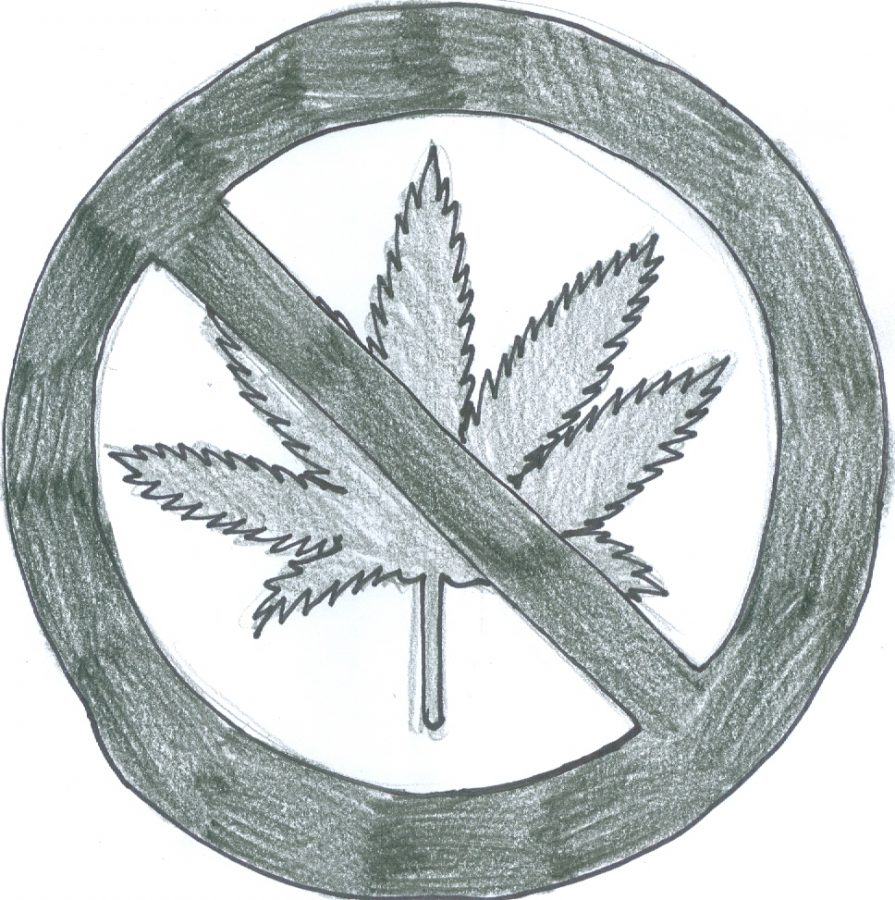Pot Legalization Sends Teens Wrong Message
Weeding Out Pot
Marijuana. Pot. Weed. It goes by many names. Most middle schoolers know what it is. Supposedly, they know not to use it. However, with many states beginning to legalize the drug for recreational use, many teens are starting to question what they learned in D.A.R.E., Drug Abuse Resistance Education. According to a survey taken in my 8th grade L.A. class, 57.2 percent of teens in the class know another teen that uses marijuana. That’s a number that should be considerably lower, considering the effects marijuana could have on a teen.
As such, it is my belief that smoked marijuana legalization is destroying teens’ lives from the inside out.
Teens have always been told of the effects of marijuana. For me, it was always a mess of stunted brain development and dopamine. However, it’s a lot worse than that. According to a “TeensHealth” article about marijuana, THC, the active compound in marijuana, connects to receptors on the brain and can affect your ability to solve problems, remember things, concentrate on the task at hand, and coordinate yourself. All of these abilities are key aspects of everyday function for a teen. Whether it be learning math or talking at lunch, these are necessary parts of learning and socializing for a teen. If they are impaired, the teen’s overall ability to take in information and communicate with other students will be hurt, causing their development to slow down at the age when it is most important. The possible effects are clear, and under no circumstances should teens be using marijuana recreationally.
We know that the effects of marijuana are bad. But why on earth would teens be using it? Most say the common answers: stress, depression, and peer pressure, among others. These reasons are the right ones, in many cases. However, I would like to pin the blame on something else: the legalization of the drug. According to the Drug-Free America Association, “If drugs become available, acceptable and cheap, they will draw in greater numbers of vulnerable youth.” The weird thing is, marijuana is being legalized for recreational use in many states, even with the known effects. It’s even already been legalized right above us in Massachusetts. To a teen, seeing adults smoke marijuana regularly creates an air of safety. After all, if our role models use it, why can’t we? Oh right, it can destroy my brain.
Thankfully, some teens can see the issue at hand. Sebi Cruz, an 8th grader, said that the drug has been legalized in places, and “this false sense of security allows them to believe that it is safe to use.”
When teens are being shown this behavior by the government and their role models, they don’t see the downsides of the drug and get themselves into an addiction that could hurt them for the rest of their lives.
According to an article on “Opposing Viewpoints,” many doctors and pro-legalization advocates say that marijuana has many medical uses. It has been recognized in the medical community that marijuana can treat symptoms like chronic pain, seizures, inflammation, nausea, and insomnia. To some degree, this is all true. Marijuana can have positive effects when used medically. However, the issue lies with how the drug is taken. There isn’t any data right now to show that smoked marijuana has the same benefits as the more specialized pill forms that contain less THC than normal weed, according to “TeensHealth.” While marijuana can be helpful, smoked marijuana carries all of the known downsides as well as the benefits, giving teens no reason to have smoked marijuana in their possession.
Imagine a high schooler. A good kid, with good grades. But they’re surrounded by people doing what they’ve been told not to do–their friends and siblings, setting an example for how to act and what to do, even though what they’re teaching is wrong. But our teen doesn’t know that. He knows only what he sees, and all of those factors are working against him. Legalization shows teens that nothing is wrong, that marijuana is safe, when in reality, it’s harmful to a teen’s ability to function. Let’s stop smoked marijuana now, before it has the chance to harm the kids of the next generation.



